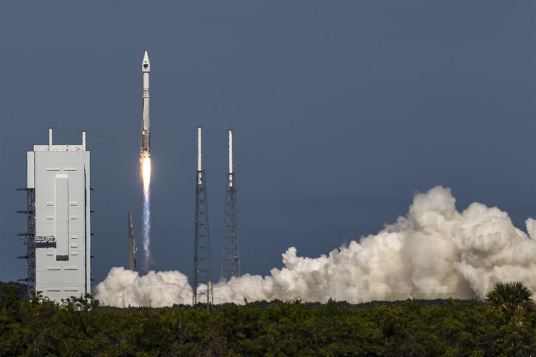begin quote from:
The
U.S. Air Force has awarded SpaceX a $82.7 million contract to launch
their GPS-3 satellite into orbit. This is the first National Security
Space (NSS) contract for SpaceX, who won essentially by default since
ULA, the only other …
SpaceX is awarded its first national security contract
 The U.S. Air Force has awarded SpaceX an $82.7 million
contract to launch their GPS-3 satellite into orbit. This is the first
National Security Space (NSS) contract for SpaceX, who won essentially
by default since ULA, the only other viable competitor, declined to bid in the competition.
The U.S. Air Force has awarded SpaceX an $82.7 million
contract to launch their GPS-3 satellite into orbit. This is the first
National Security Space (NSS) contract for SpaceX, who won essentially
by default since ULA, the only other viable competitor, declined to bid in the competition.“This GPS III Launch Services contract award achieves a balance between mission success, meeting operational needs, lowering launch costs, and reintroducing competition for National Security Space missions.” Lt. Gen. Samuel Greaves, Air Force Program Executive Officer for SpaceSpaceX winning the first competitively sourced NSS contract is evidence that the rules of the military launch market have officially changed. For more than a decade, ULA enjoyed a monopoly over these Air Force military contracts. Over the past two years, however, much has happened between SpaceX, the Air Force and ULA that changed that situation.
In April of 2014, SpaceX filed suit against the Air Force in an effort to break ULA’s monopoly and gain the ability to compete for national-security-related launches.
Elon Musk, CEO of SpaceX, argued that ULA’s monopoly of Air Force launches was unjustified. Musk stated, “This contract is costing U.S. taxpayers billions of dollars for no reason, and to add salt to the wound, the primary engine that’s used is a Russian engine.”
In January of 2015, the Air Force agreed to work with SpaceX to certify their rocket for military satellite launches and SpaceX dropped their lawsuit. Musk’s rocket company ultimately received certification from the Air Force later that year.
Today, ULA and SpaceX are the only two companies certified to compete for military launch contracts.
So why didn’t ULA bid for this one? SpaceX’s competitive prices and the fact that ULA’s rocket requires a Russian-made RD-180 engine are two of the main factors that led to that decision.
ULA’s use of a Russian engine to launch national security assets has been the source of contentious debate for a while. Congress has even gone so far as to place a purchasing ban on RD-180s altogether.

ULA’s
RD-180-powered Atlas V launch of an Air Force GPS asset in 2014 / Image
courtesy of United Launch Alliance photo / John Studwell
With the purchasing ban in effect at the time (it has since been temporarily lifted), ULA declined to bid for the GPS-3 contract, stating that they couldn’t guarantee that they would have a rocket available come May, 2018.
Last month, ULA’s engineering vice president, Brett Tobey, spoke all too frankly on the situation between ULA, their RD-180 engine and the competition with SpaceX. Among other controversial things, Tobey suggested that ULA didn’t bid for the GPS-3 contract because they couldn’t compete with SpaceX’s prices.
“Along came Elon Musk and changed the game completely…we can’t afford [to bid] any more because the price points are coming down as low as $60 million. The best day you’ll see us bid at $125 million or twice that number.” Brett TobeyTobey was later forced to resign from the company.
But price isn’t all that matters. The fact is, ULA has a longer and better track record of launches than SpaceX and, in terms of launching national security assets, that’s an incredibly important trait.
Unfortunately for ULA, their RD-180 engine will continue to be an issue until they find a reliable engine to replace it. In an effort to do just that, ULA partnered with Blue Origin and Aerojet Rocketdyne to pursue two options for an American-made engine. However, it may take until 2019 to have a launch-ready engine to replace the RD-180.
The satellite for this week’s GPS-3 contract will launch on a Falcon 9 rocket from Cape Canaveral in May, 2018.
This is the first of nine competitive launch services form the Air Force, so there are many more opportunities for SpaceX and ULA to go head-to-head and compete for these contracts.
Featured Image: Ringo H.W. Chiu/AP
No comments:
Post a Comment